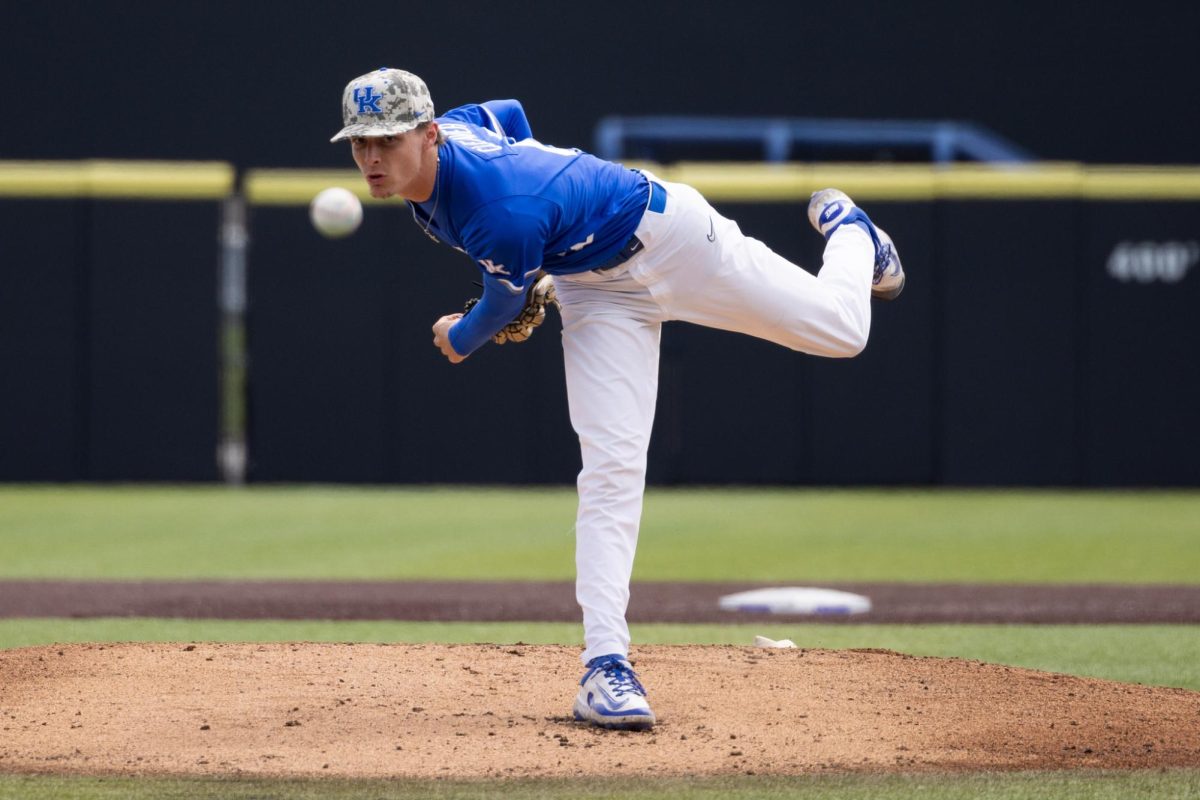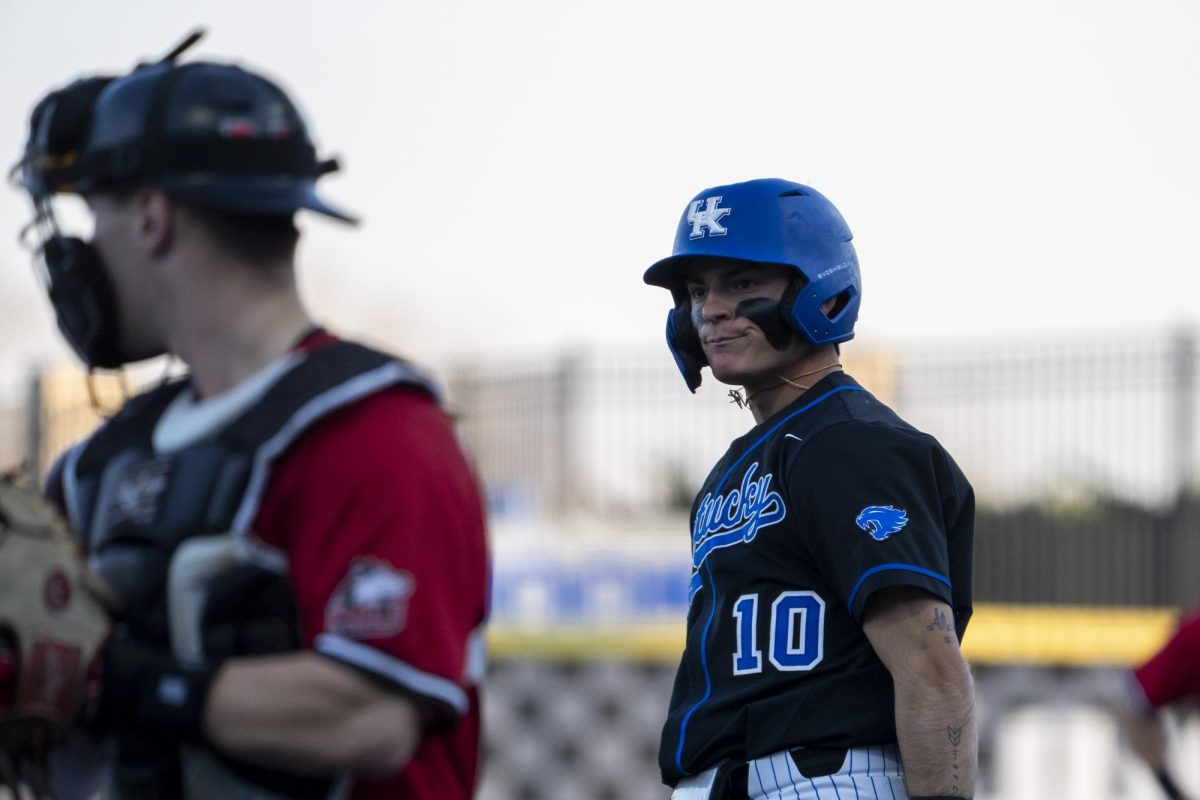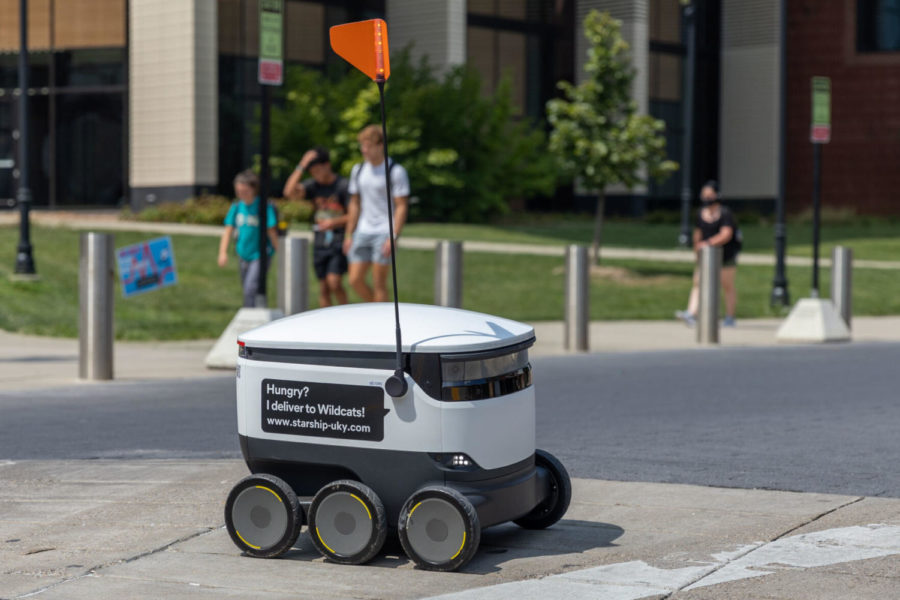The future is now, and it can deliver Starbucks
September 16, 2021
At the start of the fall semester, UK introduced electric food delivery robots to its campus. Made and operated by Starship Technologies, these robots deliver meals and drinks to students and staff.
Starship Technologies, founded in 2014, states on its website that it is “the world’s leading robot delivery service for university college campuses.” Headquartered in San Francisco, the company has tested its services in over 100 cities in both the U.S. and Europe. They began delivering to universities in 2019. Today, Starship has robots on over a dozen campuses, including UCLA, UT Dallas and Bowling Green University.
Thirty robots were introduced to UK’s campus on Aug. 16 and began full operations on Aug. 23, the first day of classes. Andrew Russell, the Starship Technologies Site Lead at UK, manages the day-to-day operations of the robots and addresses issues between customers and vendors. He said there were no major issues encountered in implementing the robots at UK, and the launch went “very smoothly.”
“Both parties [UK and Starship] worked diligently for months to launch,” Russell said. “I’m proud of UK Dining, the restaurants and the students for working with us.”
Customers can order meals and set pickup or delivery locations on the Starship Deliveries app. Multiple on-campus restaurant options are available, including Panda Express, Subway and Starbucks.
Each robot is equipped with sensors and turn signals to navigate around objects. They also have speakers that allow them to communicate with people. Once an order is placed, customers are able to track the robot to ensure that they meet at the correct time and place. When a customer’s robot arrives, they can scan a QR code on the robot to unlock it and retrieve their food.
“I think they are pretty cool and keep up with modern technology,” sophomore Madison Mooney said.
Customers pay a $1.99 delivery fee in addition to the cost of their order. They can pay in the app using credit cards or UK Flex accounts.
Kylie Hodge, a freshman pre-nursing major who has ordered Papa John’s and Eiffel Pizza through the robots, said the process is “very efficient.” She said she liked the convenience and the inexpensive delivery fee.
Starship declined to give specific details about its contract with UK, but Russell said UK has not paid for a set number of robots, and the fleet size may change based on business demands.
Russell also said the robots do not have a set price. Starship reported at a 2018 AI conference that each robot costs $5,500, but the company has goals to lower the price to $2,250.
Sophomore Thomas Mooney said he would order from the robots, but he also expressed concerns about the robots creating fewer fewer opportunities for social interaction in a world already full of contact and distance restrictions.
“It’s the problem of less person-to-person contact, even verbally, because it takes another element out of interacting with people,” he said.
Christian Wallace, the marketing manager at UK Dining, said there isn’t yet “sufficient data” to determine whether or not the robots will cause a decrease in in person dining.
“We will have to wait a bit more and see,” he said, pointing out that the robots have been on campus for only a month.
Other concerns are more logistical. Tess Hodge, a freshman who has had Starbucks and Eiffel Pizza delivered by the robots, complimented the convenience and security of the robots’ locking feature, but she noted that they do not always keep food and drinks stable inside once the cargo compartment is locked.
“[The food] just comes in, and it’s already ready for you,” she said. “Sometimes there can be stuff spilled at the bottom, but that’s the most I’ve seen.”
Some students are concerned about the robots’ ability to navigate around cars and pedestrians. The robots only travel on sidewalks and pedestrian crossings, and they are monitored in case they get stuck or run into hazards during their route and need service.
However, they are still not immune to vehicular collisions. On Aug. 31, law student Rachel Bierman posted a video to TikTok showing a robot being hit by a turning car while trying to cross South Limestone Street. As of Sept. 14, the video has over one million likes.
“I thought [the robot] was cute waiting at the crosswalk and how it was going to cross. I didn’t know it was going to get hit,” Bierman said.
While Bierman thinks the robots are “cool little bots,” she does not believe drivers have “great awareness” of them.
“I honestly didn’t know they crossed roads until I saw that one,” she said. “I remember seeing one Instagram post from [UK] about them being on campus, and that’s it, so I assume the person in the car probably didn’t know either.”
Delivery robots are officially classed as pedestrians and allowed to drive on public streets and sidewalks in 14 states. According to a database of state laws on RList, Kentucky does not have any specific laws covering delivery robots.
Russell said that when accidents like the one Bierman filmed happen, Starship takes action to prevent them. In that specific case, the robots’ paths were changed so that they only cross Limestone if it is necessary to make or return from a delivery.
“We assess the situation and take the proper steps to determine what happened and why,” he explained. “Paths and routes can be changed to protect the safety of people and the robots.”
Despite these concerns, some students still show interest in the robots.
“They’re sort of weird as a new thing,” Thomas Mooney said. “They will take some getting used to, but I think people will use them slowly.”




























































































































































